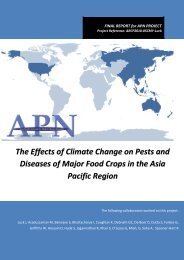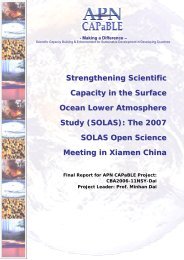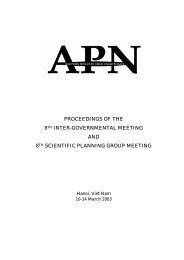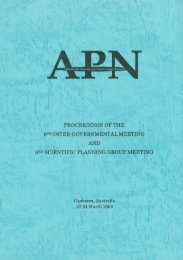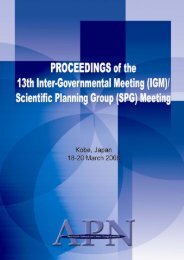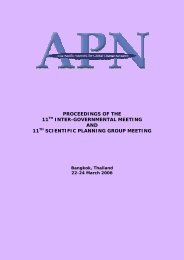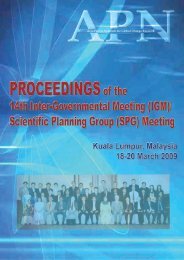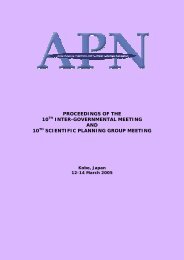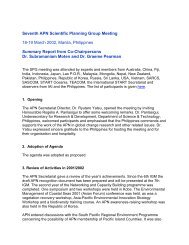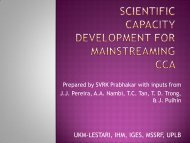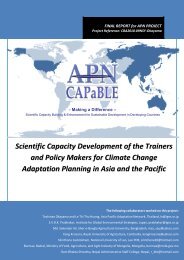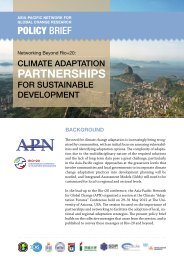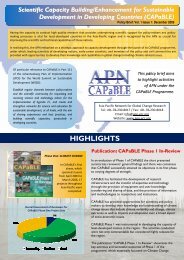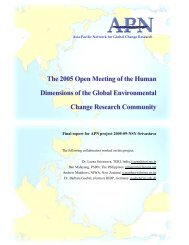APN Newsletter - Asia-Pacific Network for Global Change Research
APN Newsletter - Asia-Pacific Network for Global Change Research
APN Newsletter - Asia-Pacific Network for Global Change Research
You also want an ePaper? Increase the reach of your titles
YUMPU automatically turns print PDFs into web optimized ePapers that Google loves.
and decide on the launch of a strategy <strong>for</strong> sciencepolicy<br />
liaison. CoP discussions will be supported by<br />
a first science-policy dialogue on 27 June, which will<br />
bring together leading scientists, policy-makers and<br />
CoP delegates to share some of the most important<br />
findings of IAI research and, more importantly, help<br />
the Institute think through its scientific agenda <strong>for</strong><br />
the next decades. Participants will discuss two topics:<br />
(1) “Resource management between production,<br />
mitigation and sustainability”, to explore the linkages<br />
of global change with one of the highest policy priorities<br />
virtually everywhere in the world: food production;<br />
and (2) “New goals of science governance:<br />
networking, relevance, communication”, to better<br />
understand the evolving governance of international<br />
scientific research.<br />
It is clear that the importance of the integrated<br />
approach that IAI, and <strong>APN</strong>, represents will continue<br />
to grow in the future. Political and economic systems<br />
may lean towards different degrees of globalization,<br />
De<strong>for</strong>estation of tropical, old-growth <strong>for</strong>ests in<br />
least developed to rapidly developing countries<br />
in the <strong>Global</strong> South is a topic that is receiving<br />
unprecedented attention. The challenge is clear:<br />
de<strong>for</strong>estation is adding significantly to atmospheric<br />
greenhouse gas concentrations (13–17% of global<br />
emissions). De<strong>for</strong>estation rates are highest in the<br />
poorest countries and de<strong>for</strong>estation is a major path<br />
to development <strong>for</strong> these countries, as it was <strong>for</strong><br />
developed countries centuries earlier. While developing<br />
countries cannot be obligated under existing<br />
international law to stop de<strong>for</strong>esting, they could be<br />
compensated <strong>for</strong> not clearing their <strong>for</strong>ests by devel-<br />
regionalization or national assertiveness, but the<br />
underlying biophysical systems will continue to hold<br />
us all together, and there is no escaping the determinant<br />
effect that the human footprint has on these<br />
systems. So the role of IAI, as a unique inter-governmental<br />
research institution <strong>for</strong> the Americas, with a<br />
mandate to shed light on these dynamics and help<br />
policy-makers, will only grow in importance. The task<br />
is to connect all this knowledge with decision-making.<br />
For more in<strong>for</strong>mation, please contact Nicolas Lucas at<br />
nlucas@dir.iai.int.<br />
Nicolas Lucas<br />
Communications and Policy<br />
Specialist, Inter-American<br />
Institute <strong>for</strong> <strong>Global</strong> <strong>Change</strong><br />
<strong>Research</strong> (IAI)<br />
Conference Report<br />
Beyond Carbon: Ensuring<br />
Justice and Equity of REDD+<br />
Across Levels of Governance<br />
Heike Schroeder<br />
oped countries, which have the responsibility and<br />
capability to pay. This is the original idea behind what<br />
has been termed “Reducing Emissions from De<strong>for</strong>estation<br />
and Forest Degradation” with compensations<br />
also <strong>for</strong> <strong>for</strong>est conservation, enhancement of <strong>for</strong>est<br />
carbon stocks and sustainable <strong>for</strong>est management<br />
— REDD+.<br />
A wide range of actors, interests and ideas have<br />
emerged to shape this process across international,<br />
national and local institutions and a cacophony of<br />
different initiatives, programmes and policy paradigms<br />
have ensued, all of which are in some way<br />
Beyond Carbon: Ensuring Justice and Equity of REDD+ Across Levels of Governance •<br />
9<br />
Features



